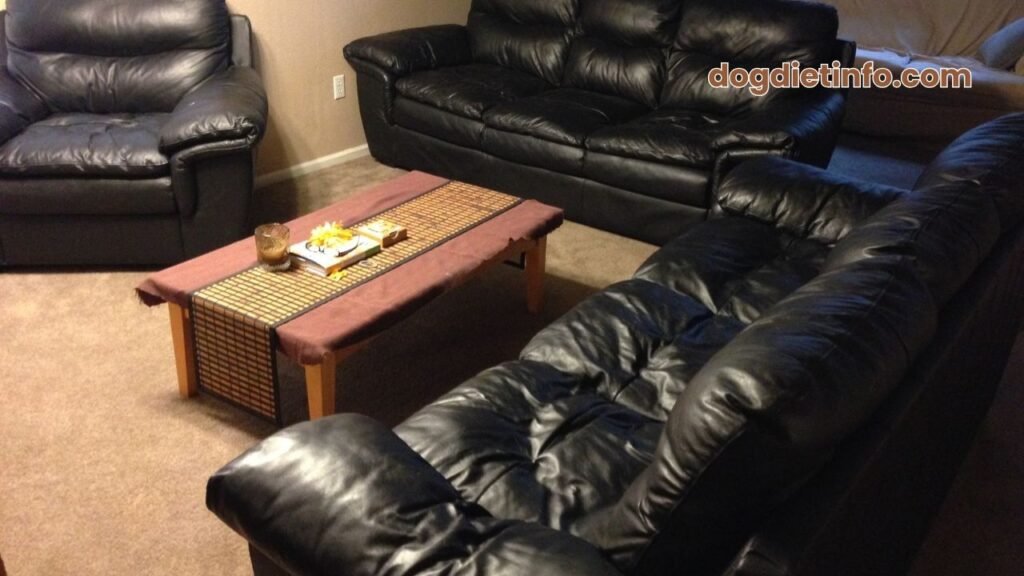Are Leather Couches Good For Dogs? Leather couches are generally good for dogs as they are durable, easy to clean, and resistant to odors.
As a dog owner, you might be wondering whether a leather couch is a practical and durable choice for your home.
After all, we love our dogs, but their sharp claws, fur, and occasional accidents can pose a challenge when it comes to choosing the right furniture.
Leather couches are often viewed as a stylish and luxurious option, but are they really dog-friendly?
In this article, we’ll explore whether leather couches are good for dogs, detailing their benefits, challenges, maintenance tips, and the best types of leather to choose from.
By the end, you’ll be able to decide if a leather couch is the right fit for both you and your furry friend.
Contents
- 1 What Are Leather Couches?
- 2 Benefits of Leather Couches for Dog Owners
- 3 Challenges of Leather Couches with Dogs
- 4 Best Types of Leather Couches for Dog Owners
- 5 How to Maintain Leather Couches for Dog Owners
- 6 Final Verdict
- 7 FAQs
- 7.1 Do leather couches attract dog hair?
- 7.2 Can I repair scratches on a leather couch caused by my dog?
- 7.3 Is faux leather as durable as genuine leather for dog-friendly homes?
- 7.4 What’s the best leather couch type for large dogs?
- 7.5 How often should I clean and condition my leather couch if I have a dog?
- 8 Conclusion: Are Leather Couches Good For Dogs?
What Are Leather Couches?
Definition of Leather Couches
Leather couches are sofas or chairs made from either real or synthetic leather materials. Real leather is derived from animal hides, often from cows, that are processed through tanning to create a soft yet durable material.
Synthetic leathers, commonly known as faux or vegan leather, mimic the appearance and feel of real leather but are typically made from polyurethane or other plastic materials. [Are Leather Couches Good For Dogs?]
Leather furniture is known for its sleek, timeless aesthetic and its reputation for being durable and easy to maintain. These attributes make leather couches a popular option for pet owners and families alike.
Types of Leather Used in Couches
There are several types of leather used in furniture, each with its unique qualities. When deciding on a leather couch for a household with dogs, understanding the differences between leather types is essential:
- Full-Grain Leather: This is the highest quality leather, made from the top layer of the animal hide. It is durable and develops a beautiful patina over time, but it is also more susceptible to scratches and requires careful maintenance.
- Top-Grain Leather: Slightly lower in quality than full-grain leather, top-grain leather is sanded and buffed to remove imperfections. This makes it more resistant to scratches and marks, which can be an advantage for homes with dogs. [Are Leather Couches Good For Dogs?]
- Bonded Leather: Made from scraps of leather that are bonded together with adhesive, bonded leather is a more affordable option. However, it is less durable and can wear out quickly, especially with heavy use from pets.
- Faux Leather (Vegan Leather): Faux leather is made from synthetic materials like polyurethane. While it can mimic the look of real leather, it doesn’t have the same durability. It’s a budget-friendly and animal-friendly alternative but may crack or peel over time.

Benefits of Leather Couches for Dog Owners
Leather couches have several advantages that make them a good option for dog owners. Below are the key benefits of choosing leather furniture if you have pets.
1. Durability
One of the most significant benefits of leather couches is their durability. High-quality leather, such as full-grain or top-grain, is strong and can withstand the everyday wear and tear of a busy household with pets.
Dogs can be rough on furniture, especially when jumping on and off the couch. Leather’s natural resilience makes it more resistant to sagging or tearing compared to fabric options. [Are Leather Couches Good For Dogs?]
Additionally, leather doesn’t stretch out or fray as easily as fabric, which means it can maintain its appearance longer, even with regular use by dogs.
2. Easy to Clean
Another major advantage of leather couches is that they are incredibly easy to clean. Pet hair, dirt, and stains are much easier to remove from leather surfaces than from fabric couches.
A simple wipe with a damp cloth can remove fur, muddy paw prints, or minor spills. For more stubborn stains, you can use leather-specific cleaning products without worrying about damaging the material.
Unlike fabric couches, which can trap odors and require deep cleaning, leather repels most dirt and liquids. This makes maintaining a leather couch less of a hassle, especially when living with dogs. [Are Leather Couches Good For Dogs?]
3. Odor Resistance
Dogs can sometimes bring unwanted smells into the home, but leather is naturally odor-resistant. While fabric couches tend to absorb odors from pets over time, leather doesn’t hold onto smells as easily.
If your dog has been outside playing or has a specific odor, you won’t have to worry about your couch absorbing it. [Are Leather Couches Good For Dogs?]
This is a huge advantage for dog owners who want to keep their home smelling fresh without constantly cleaning or deodorizing their furniture.
4. Stylish and Timeless
Leather couches are synonymous with style and sophistication. They offer a timeless look that can elevate the overall aesthetic of any living room.
Whether you prefer a modern, rustic, or classic design, leather couches come in a wide variety of colors and finishes that can blend into many different decor styles.
For dog owners who want both functionality and elegance, leather couches strike the perfect balance. [Are Leather Couches Good For Dogs?]
And because leather ages well, developing a patina over time, the couch can actually become more beautiful with age, even with dogs around.
See Also: Is Advantix II Safe For Dogs?
Challenges of Leather Couches with Dogs
While leather couches offer many advantages, they also come with their fair share of challenges when dogs are part of the household. Here are some potential downsides to consider.
1. Scratches from Claws
Leather is durable, but it isn’t completely scratch-proof. Dogs’ claws can leave visible marks on the surface of the leather, especially if they jump up and down frequently.
This is particularly true for soft, full-grain leather, which is more prone to showing wear and tear. [Are Leather Couches Good For Dogs?]
To prevent or minimize scratches, it’s essential to trim your dog’s nails regularly. You can also invest in furniture covers or throws to protect the leather when your dog is lounging on the couch.
2. Potential for Punctures
In addition to scratches, punctures are another concern with leather couches. Larger dogs or more active dogs that jump or play on the furniture may cause punctures in the leather with their nails or if they bring toys to the couch.
Once punctured, leather can be challenging and expensive to repair, depending on the severity of the damage. [Are Leather Couches Good For Dogs?]
While puncture damage isn’t as common as scratches, it’s still a risk, particularly with thinner or lower-quality leather like bonded leather.
3. Temperature Sensitivity
Leather has a reputation for being temperature-sensitive. In hot weather, leather can become sticky and uncomfortable for both you and your dog.
In cold weather, leather can feel stiff and chilly, which might discourage your dog from using the couch altogether. [Are Leather Couches Good For Dogs?]
To make the couch more comfortable, you can place soft blankets or cushions on the surface to regulate the temperature. This also helps protect the leather from damage while providing a cozy spot for your dog to rest.
Best Types of Leather Couches for Dog Owners
Choosing the right type of leather is crucial for dog owners. Here’s a breakdown of the most suitable leather types for homes with pets.
1. Top-Grain Leather
Top-grain leather is an excellent option for dog owners. It is strong, durable, and more resistant to scratches than full-grain leather.
Top-grain leather undergoes a process that removes imperfections, creating a smooth, uniform surface that holds up well to daily wear from dogs. It’s also easier to maintain and clean, making it a practical choice for pet-friendly homes.
2. Bonded Leather
While bonded leather is a budget-friendly option, it is less durable than top-grain or full-grain leather.
It may not be the best choice for homes with large or highly active dogs, as it can wear out faster and is more prone to cracking and peeling over time.
However, for smaller dogs or if you’re looking for an affordable solution, bonded leather may still work. [Are Leather Couches Good For Dogs?]
3. Faux Leather
Faux leather, also known as vegan leather, offers an animal-friendly alternative to genuine leather.
While it doesn’t have the same durability as real leather, it is easier to clean and less expensive. However, faux leather can crack and peel with frequent use, especially if your dog is rough on furniture.
How to Maintain Leather Couches for Dog Owners
To ensure your leather couch stays in good shape despite the presence of a dog, it’s important to follow these maintenance tips:
1. Regular Cleaning
Leather couches require regular cleaning to maintain their appearance. Wiping down the surface with a damp cloth once or twice a week can remove fur, dirt, and stains.
For more thorough cleaning, use a leather-safe cleaner to preserve the material’s integrity. Avoid using harsh chemicals that could damage or dry out the leather.
2. Using Protective Covers
One way to prolong the life of your leather couch is by using protective covers or throws. These can help shield the couch from scratches, punctures, and dirt.
Slipcovers or blankets are easy to remove and clean, making them a practical addition to any pet-friendly home. [Are Leather Couches Good For Dogs?]
3. Conditioning the Leather
Leather needs to be conditioned regularly to keep it soft and supple. Conditioning prevents the leather from drying out and cracking, especially in homes with pets.
You should aim to condition your leather couch every 3-6 months, depending on how frequently it’s used.
4. Preventing Claw Damage
To minimize the chances of scratches, it’s important to keep your dog’s claws trimmed. You can also try using pet-safe scratch deterrent sprays or invest in pet nail caps to protect your furniture.
Final Verdict
So, are leather couches good for dogs? The answer largely depends on the type of leather and how willing you are to maintain it. [Are Leather Couches Good For Dogs?]
High-quality leather couches, especially top-grain leather, are durable, easy to clean, and stylish, making them an excellent option for dog owners.
However, they are susceptible to scratches and punctures, so regular maintenance and protective measures are essential.
If you’re willing to invest in the right type of leather and take steps to protect your couch, leather can be a great choice for homes with dogs.
FAQs
Do leather couches attract dog hair?
No, leather couches do not attract dog hair. Pet hair can be easily wiped off or vacuumed from the surface. [Are Leather Couches Good For Dogs?]
Can I repair scratches on a leather couch caused by my dog?
Yes, minor scratches can often be repaired using a leather repair kit or leather conditioner. For deeper scratches, you may need professional repair.
Is faux leather as durable as genuine leather for dog-friendly homes?
No, faux leather is generally less durable than genuine leather and may crack or peel with frequent use, especially in homes with active pets.
What’s the best leather couch type for large dogs?
Top-grain leather is the best choice for large dogs due to its durability and resistance to wear and tear.
How often should I clean and condition my leather couch if I have a dog?
It’s recommended to clean your leather couch weekly and condition it every 3-6 months to maintain its softness and durability.
Conclusion: Are Leather Couches Good For Dogs?
Leather couches can be a great addition to dog-friendly homes, offering durability, easy maintenance, and a timeless look.
While there are some challenges, such as potential scratches and temperature sensitivity, the benefits of owning a leather couch—especially the ease of cleaning and odor resistance—make it an attractive option for pet owners.
With proper care, including regular cleaning, conditioning, and protective covers, a leather couch can be both a functional and stylish investment for you and your dog.

Derrick Wilcox is a certified canine behaviorist with over 12 years of experience at Happy Paws Animal Clinic and Pawsitive Training Center, helping pet owners ensure safer, healthier, and happier lives for their dogs.



